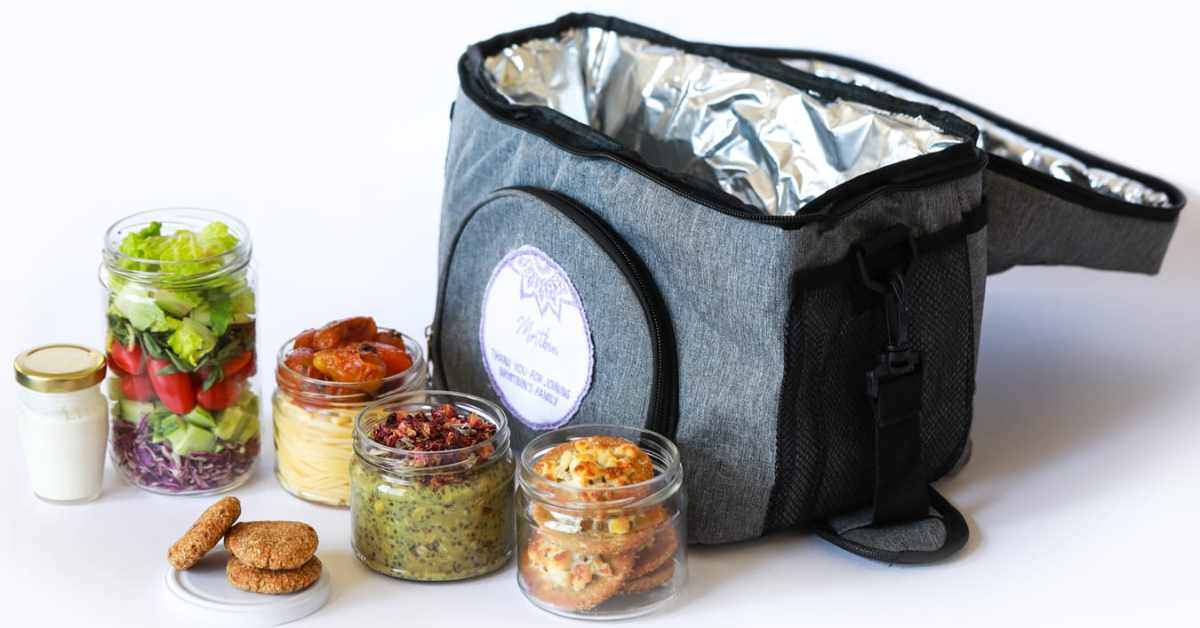When leading a busy life, many people are unable to prepare their meals, relying instead on food delivery, resulting in a lot of plastic waste. For one person’s meals, packaging waste can reach up to eight kilos per month.
Hanine Ghannam is working to redefine ready-to-eat meals and meal delivery services through her startup, Mortben. Mortben meals are eco-friendly, prepared from natural, healthy ingredients, and free of redefined carbohydrates and hydrogenated oils. By subscribing monthly to Mortben instead of a traditional meal delivery service, you reduce plastic waste by seven kilograms and support rural women and chefs who are preparing these curated meals for you.
Q: Why did you decide to work on this solution?How did you get started?
A: I am a dietitian and follow a healthy diet. However, three years ago, I was working two jobs and doing my Ph.D. I didn’t have the time to prepare my own meals, so I became dependent on meal packages. Since I recycle at home, I’ve noticed that this waste is producing a lot of plastic waste, so I decided to find an alternative that is healthy, clean, plant-based, and eco-friendly. That’s when I started combining my knowledge of nutrition and management.
Q: How does your product work?
A: Mortben sells ready-to-eat meals and snacks through an e-commerce website, social media platforms, calls and messaging, and retail stores. We provide healthy and eco-friendly meals and meal packages packed in glass jars. Currently, Mortben is a registered company with a team of ten passionate individuals, eight of whom are women. By offering discounts to our customers, we are currently recycling 70% of the containers (jars) that are sent to them.
Q: What makes your solution special or unique?
A: Mortben is a life-friendly business, good for the planet and for people. Our main aim was to redefine healthy eating in the most sustainable way and to reduce solid waste coming from ready-to-eat meals and meal packages. In addition, we have taken major green steps to be the most eco-friendly meal delivery service in Lebanon. Some of these steps are: operating the kitchen with solar energy; reducing the delivery frequency; purchasing from local farmers and suppliers; reducing food waste; and composting what is left. On the other hand, food is prepared by rural women and mothers, and the ingredients are the healthiest possible (seasonal, natural, organic, free of refined carbs and hydrogenated oil, etc.). Also, these ingredients are supplied by farmers from rural areas.
Q: Who is benefitting from your solution? How is your solution relevant to your sector and to Lebanon?
A: The ongoing Lebanese economic crisis has taken a significant toll on its citizens, compounding the effects of an existing waste crisis. The waste crisis has now resurfaced with the outbreak of the coronavirus pandemic in Lebanon. As per the Plastic Garbage Program, Lebanon generates about 1.57 million tons of waste per year, with 14% of this waste being plastic. Also, the number of meal delivery providers, such as restaurants, diet centers, ready-to-eat brands, etc., is increasing in Lebanon, and people are becoming more dependent on them. Meal packages and subscriptions (weekly and monthly) are producing a huge amount of plastic waste per individual. Mortben is redefining ready-to-eat meals and meal delivery services by offering a healthy, convenient alternative for busy individuals and families.
Q: Why did you apply to the program?
A: When Mortben started to grow fast, I felt overwhelmed, working for 16 hours per day, and was immersed in the daily operations. At this stage of the business, I felt that we needed every single piece of advice and we needed an expert’s opinion on all the aspects of the business, and the GIMED program was really on point, especially the coaching sessions. This program allowed me to take a step back and see the business from another perspective. The capacity-building sessions were like a preparatory phase to set our priorities and our entrepreneurial mindset. The coaching phase was where the actual work came in. I believe that I was privileged to get the opportunity to work closely with experts on my business. There wasn’t a single session or exercise in the GIMED program where the “aha” moment didn’t occur. It is amazing how much we have learned during this year and how we took the business to another level without even noticing.
Q: What were you hoping to achieve when you applied to it?
A: Well, our expectations weren’t so high, we were looking for business guidance, but what we got and are still getting is much more. There is an endless list of takeaways that I can recall from the beginning of this program until now. The highlight of the capacity-building phase was accepting the idea to learn everything from a different perspective. Belonging to a community of like-minded people creates an impact on this country’s environment, economy, and society. The coaching sessions were immaculate in all the modules, but what was an eye-opener for me was the way I started digging deeper into all the aspects of the business and openly admitting mistakes to do things right.
Q: What did you achieve so far?
A: In the scope of two years, we grew from two team members to ten team members, moved two kitchens, created and adjusted more than 200 recipes, and served more than 600 happy customers. My key success factors are being flexible when it comes to operations or strategic decisions and being transparent with our customers and employees.
Q: If you had to choose one achievement to highlight, what would it be and what lessons did you learn from it?
A: We changed our business model after one month of launching. We used to sell individual fixed jars in supermarkets, but after the COVID measures in the country, we started offering meal packages through a subscription model, and this was a turning point in the business.
Q: What are the main challenges that you have faced so far?
A: I believe that challenges play a significant role in entrepreneurship, anywhere in the world except for Lebanon. Every day, we must face unpredictable and new challenges in addition to the common ones. It takes a lot of passion and hard work to survive as a startup with minimal capabilities. I’m not exaggerating when I say that 50% of my energy and time is spent on these challenges, especially since some of them might directly affect our customers and continuity. There are recurring challenges that are affecting every business, such as the fluctuation in the price of raw ingredients, the currency rate, the availability and prices of fuel, and a lot more. However, what we really struggled with was finding and retaining our customers.
Q: How did you overcome these challenges?
A: We tried to find solutions to stay independent from external factors, so we started pricing in USD, installed a solar system, bought raw ingredients in bulk, and collected as much data as possible about our customers. Additionally, we created a positive culture in the kitchen and the office, which gave us a lot of support and motivation to continue.
Q: What is one thing you would have done differently throughout your journey? Have you ever thought of giving up on your venture? If yes, what made you pull through?
A: One thing I would have done differently is to hire a business coach earlier in the process. Whenever people told us about entrepreneurship, they talked about dreams and freedom. Despite that, they never tell us about responsibility, stress, risks, or that we are moving from a 9-to-5 job to a full-time job where there’ll be no weekends or holidays. I used to think daily about giving up on this whole thing and working a less stressful job, but I’ve put my heart into creating and growing Mortben, and to me, having a business with purpose and impact is the most rewarding thing ever. In addition, I am grateful now for the community of entrepreneurs I belong to and for the amazing team at Mortben.
Q: What advice would you give an entrepreneur who is starting out in your industry?
A: My advice would be to be flexible and open to change. Do not stop experimenting; you can never figure out the right timing and way to do things without starting. So act, assess, and learn from entrepreneurs and experts, and the right thing will fall into place.
About GIMED
Berytech is the official partner of The Green Impact MED Project – Positive Investments for Positive Impacts (GIMED), an EU-funded project under the ENI-CBC Med Programme aiming at supporting green entrepreneurs to better access finance and market in the Mediterranean. The project provides training, coaching sessions, capacity building workshops, and sub-grants to consolidate green business creation and green business development. Learn more about the GIMED Project.










